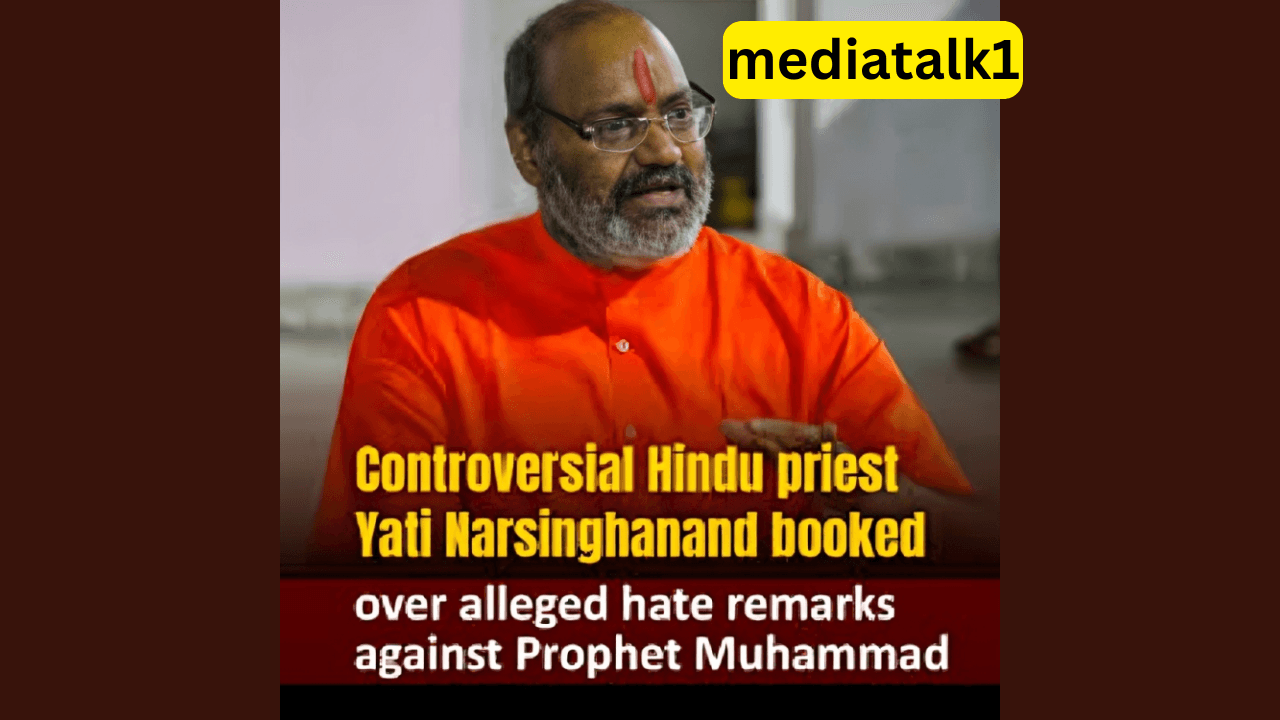In a recent development, Yati Narsinghanand Saraswati, a Hindu priest known for his provocative and inflammatory remarks, has once again ignited controversy by making derogatory comments about the Prophet Muhammad. His blasphemous statement has triggered widespread anger among the Muslim community, leading to calls for his immediate arrest and stringent legal action.
Recent Controversial Remarks.
Narsinghanand, notorious for his divisive rhetoric, recently gave a statement that many consider an attack on the sanctity of Prophet Muhammad. In his speech, he made disparaging remarks that are seen as not only disrespectful but intentionally provocative. This recent incident is not the first time Narsinghanand has been in the news for spreading hate speech; he has previously made anti-Muslim remarks, calling for violence and stoking communal tensions.
His latest comments have spread rapidly across social media platforms, where many are expressing their anger and hurt over his words. Muslims in various parts of India have organized protests, demanding that the government take swift and firm action against him for his blasphemous statements.
Why Has No Action Been Taken?
Despite the growing outrage and multiple complaints filed against him, there appears to be little to no action taken by the government to hold Narsinghanand accountable for his hate speech. Many are asking why the authorities have not yet arrested him or even condemned his recent remarks. Critics argue that the government’s silence on the issue raises serious concerns about whether the administration is committed to protecting religious harmony.
Activists and religious leaders from the Muslim community have expressed their disappointment with the government’s handling of the situation. Several leaders have pointed out that similar cases in the past involving offensive remarks against other religions have resulted in quick arrests and legal proceedings, but in this case, there seems to be a delay. This perceived inaction has led to growing frustration and mistrust among the Muslim community toward the government.
Legal Complaints and Calls for Arrest.
Several organizations have filed complaints against Narsinghanand under sections of the Indian Penal Code that address hate speech, incitement of violence, and blasphemy. However, despite these complaints, the authorities have yet to take any concrete steps. Prominent Muslim leaders and human rights activists have urged the police and judiciary to expedite the investigation and arrest Narsinghanand before his words further escalate communal tensions.
“There is no place for hate speech in a democratic and secular country like India. His words are not just an insult to our Prophet, but they threaten the very fabric of unity in this nation,” said one protester during a recent rally.
Impact on Communal Harmony.
India, known for its religious and cultural diversity, has always been sensitive to issues surrounding religious sentiments. Narsinghanand’s continuous use of inflammatory language has added fuel to an already volatile atmosphere, with many fearing that his statements could incite further violence and lead to communal unrest. Several cities have seen an increased police presence in response to protests demanding his arrest.
Many are calling for the government to set a precedent by acting swiftly against Narsinghanand, arguing that failing to do so could embolden others to engage in similar hate speech. “If such people are allowed to walk free after making such derogatory comments, it sends a message that religious sentiments can be insulted without consequence,” remarked a religious leader in Delhi.
Government’s Response So Far.
While the government has not yet issued any official statement regarding Narsinghanand’s recent remarks, political analysts speculate that the administration is trying to avoid a large-scale confrontation. However, this silence is being interpreted by many as a sign of reluctance or even tacit support for those who propagate hate speech. Critics argue that by failing to address this issue decisively, the government risks damaging its reputation as a protector of all religions and upholder of secular values.
The police, on their part, have claimed that they are “looking into the matter,” but have not yet provided a clear timeline for any potential action. In the past, authorities have been quick to act in similar cases, leading to questions about why this case is being handled differently.
Conclusion.
Narsinghanand Saraswati’s recent derogatory statements about Prophet Muhammad have caused widespread anger, protests, and calls for immediate action. His repeated blasphemous remarks continue to test the limits of India’s communal harmony. The government’s delay in responding to these developments has led to frustration among those calling for justice. As protests grow louder, the public will be closely watching how the authorities handle this sensitive issue. Will they act to preserve peace and unity, or will inaction allow further unrest to unfold?
FAQs
- Who is Narsinghanand Saraswati?
Narsinghanand Saraswati is a Hindu priest known for making provocative and inflammatory statements, especially targeting the Muslim community. His remarks often incite controversy and outrage. - What did Narsinghanand say about Prophet Muhammad?
Narsinghanand recently made derogatory remarks about Prophet Muhammad, sparking protests and demands for legal action. His comments were seen as blasphemous and disrespectful to the Muslim faith. - Why hasn’t the government taken action yet?
Despite multiple complaints filed against him, the government has yet to take any concrete action. Many believe that political considerations or reluctance to confront Narsinghanand’s followers might be causing the delay. - What are the potential consequences of this incident?
Narsinghanand’s remarks could lead to further communal tensions, violence, and unrest if not addressed quickly. Many fear that his words might encourage others to engage in hate speech and deepen religious divides. - What can be done to prevent such incidents in the future?
Activists and religious leaders are calling for stricter laws against hate speech and blasphemy, quicker legal proceedings, and more government accountability in protecting religious harmony.
